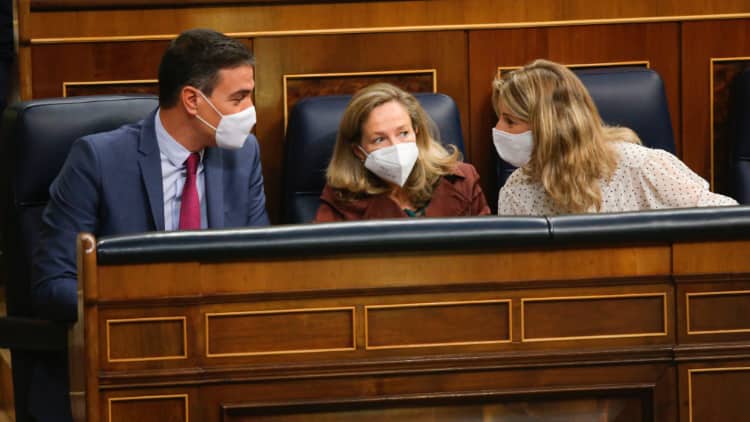Ángel Collado
The publication of the contract signed by the European Commission with the Spanish government to receive the economic recovery funds has once again revealed Pedro Sánchez’s double game: committing reforms to Brussels that he conceals and postpones in Congress because he does not have a parliamentary majority to push them through.
This time it is the denied cut in pensions that appears very clearly in the aforementioned document and with the same formula that the Minister of Social Security, José Luis Escrivá, left written in January of this year. And the same rejection as then has already been registered from the conglomerate of political and trade union forces that support the government, the first being that of the communist sector (Podemos) of the Executive itself.
To get the Spanish economy back on its feet after the pandemic, Sánchez has 70 billion euros from the EU which, administered from his cabinet, have become the key to his stability in power. In exchange, the head of the executive promised to undertake far-reaching reforms to favour economic growth and employment on the one hand, and to make the pension system (bankrupt for the past two years) sustainable with the appropriate adjustments on the other.
With the labour counter-reform bogged down in the same terms that we explained in The Diplomat last month, the government has yet to present the real pension reform in Spain to the so-called social agents (trade unions and business associations), parliamentary allies and the opposition. The text on the matter that it took to Congress in September is limited to ensuring that pensions are revalued according to the consumer price index (inflation), but does not establish any adjustments that would give credibility to the sustainability of the system in the medium term.
The Ministry of Social Security has announced the change from the old “sustainability factor” established by the previous government to one of “intergenerational solidarity”, which it is due to explain this week. It has been postponing it since before the summer to delay the inevitable: to set out in a text the formulas for the adjustments or cuts that the State will have to apply in the coming years to the expectations of future pensioners.
The contract with the European Commission alludes to the first measure launched by Escrivá himself, an increase in the number of years included in the calculation of taxpayers’ pensions from the current 25 to 35. The system’s bill would fall as soon as the measure came into force, to the detriment of the majority of workers retiring from now on.
The reaction of the communist sector of the government has been fulminant. Podemos boasted of having stopped the project before, when Pablo Iglesias was still in the cabinet, and now reiterate that they will oppose it in any case, even if it is a commitment signed with the European Commission in exchange for its financial assistance.
And the biggest internal problem for Sánchez is that no matter how much euphemism Escrivá includes in his formula for adjusting the pension system, it will always mean increasing the years of contribution and/or reducing expectations about the amount of those future pensions. The podemites, now headed in the Executive by the vice-president Yolanda Díaz (also a promoter of the labour counter-reform and with the trade unions always behind her), reject any adjustment in future pensions.
Sánchez, who has just asked Brussels for 10,000 million euros to finish the 2021 financial year, is not fulfilling any of the commitments made to receive this financial assistance, which is also the mainstay of the General State Budget. The accounts in parliamentary procedure include 27 billion euros of European “bailout” for next year, while the contract signed with the Commission last week only includes the transfer of 20 billion euros. This is another example of the budgetary imbalance and the lack of control of the public deficit in which Spain finds itself despite the government’s triumphalism about the economic situation.
Sánchez, without a parliamentary majority to undertake fundamental reforms, is now risking the arrival of European funds while trying to maintain the same tactic of promising one thing in Brussels and the opposite to his allies in Spain.







